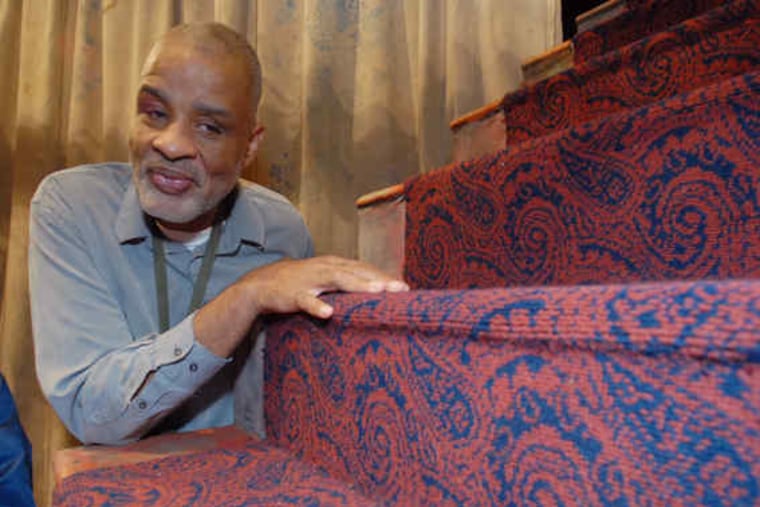Making local arts more accessible to the impaired
Dan Simpson is already a serious theatergoer. He subscribes to the Arden, never misses a show by Amaryllis, and counts the Philadelphia Theater Company as one of his favorites. Yet he's never seen a performance: Simpson, 57, is blind.

Dan Simpson is already a serious theatergoer. He subscribes to the Arden, never misses a show by Amaryllis, and counts the Philadelphia Theater Company as one of his favorites. Yet he's never seen a performance: Simpson, 57, is blind.
But thanks to increased programming sponsored by Independence Starts Here, Simpson can still enjoy the city's rich cultural scene. He has taken advantage of preshow "sensory seminars" that allow him to touch sets, props and costumes; used audio-description technology during performances; and he has found Braille programs available more often.
"I'll still go to theaters that don't have those things," said Simpson, a Lansdowne resident. "But imagine going to a restaurant that had a menu you couldn't read. Then, going someplace where somebody's gone to the trouble of getting a menu in Braille or describing something. You feel so much more welcome."
That's part of the mission of Independence Starts Here: making cultural programming, from plays to mural tours to museums, more accessible to people with visual and hearing impairments. The multifaceted program - a partnership between Art-Reach, the Greater Philadelphia Cultural Alliance, and Amaryllis Theatre Company - began this month to commemorate Disabilities Awareness Month.
"We know how much difficulty arts organizations have had to hold audiences. This will help build new ones," said Michael Norris, executive director of Art-Reach, a nonprofit organization that helps underserved audiences in this region to enjoy arts and cultural events.
Philadelphia theater companies will now have access to an open-captioning system - LED displays that operate like a television's closed-captioning option - at no charge. They can borrow headsets and other technology needed for audio descriptions, and have staff trained to use the equipment for no charge.
Also important? A revised Philly Fun Guide, the online calendar of events. The streamlined page is easier for a screen reader to translate. Clear icons show which performances are served by which technologies.
"If I want to find plays that have audio description, I can find that out," Simpson said. "They really listened to us when we told them what we needed."
These technologies have been around for a while, and some larger theaters have taken advantage of them, but only now is there an organized effort to share equipment among the more than 100 theater groups in the area, Norris said. It can cost as much as $2,000 per performance to employ such technology, too much for many small theater companies to afford. The hope is that more organizations will do it if it doesn't cost anything.
Because the equipment is shared, scheduling will be of utmost importance, Norris said.
"We'd love to have universal access, with every show at every time available, but at this time, it's not realistic," Norris said. "We need to build the audience."
Mimi Kenney Smith, artistic director of Amaryllis, said that audience is growing naturally.
"Most of us will experience some visual or hearing loss as we get older," Smith said. "If we still want to come to the theater, we are going to need this accessibility."
Most theaters Smith has approached are eager, but hesitant, to employ the technology, she said.
"They really think it's going to be expensive or more trouble or interfere with the quality of the artistic product," she said. "It's really a matter of sitting down and showing them."
After one show, Smith said, a man who had used audio-description technology for the first time said of the experimental production he had listened to: "I don't know if I liked the play, but I'm glad I got a chance to decide. Usually, someone else makes the decisions."
Technological Aids
Among the technologies offered to visually and hearing-impaired audiences are:
Open captioning: A text display on an LED sign that is visible to all audience members and synchronized to actors on stage. Used for scripted events.
CART (Computer-Aided Realtime Translation): For unscripted events, trained captioners listen to words or dialogue, then simultaneously type what is said on a shorthand machine, which sends the electronic data to a computer screen.
Audio-description technology: Trained technicians describe visual elements of a production - including sets, costumes, lighting, and characters' gestures or movements - to listeners via headphones.
Sensory seminars: Events held before productions that allow the visually impaired to touch sets, props, and costumes, and sometimes hear actors' voices.
ASL translators: Trained speakers of American Sign Language stand on or near the stage and provide instant translations.
EndText